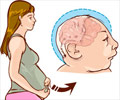Q: Which specialist treats pentalogy of cantrell?
A: Pentalogy of Cantrell is usually recognized prenatally on ultrasound. After delivery the baby is treated by a team of specialists such as neonatologists, pediatric cardiologists, general surgeons and plastic surgeons to correct the various defects that may be present with provision of supportive nursing care.
Q: What are the recent advances made in identifying possible genetic causes of this condition?
A: Research has shown that genes involved in the development of midline structures, and normal development of the conducting system of heart and the heart septa may be altered in this condition. Also a possible alteration in genes present on the X chromosome (X-linked) or autosomal recessive inheritance (where both parents are carriers of the disease having one normal and one abnormal copy of the gene and are clinically normal. However, both transmit the abnormal copy of the gene to the offspring which then has two copies of the defective gene and gets the disease ) has been implicated but more research is needed to gain a better understanding about the condition and why it occurs.
Q: What are other conditions that need to be considered in the differential diagnosis?
A: Isolated ectopia cordis caused by a sternal or a pericardial defect, amniotic band syndrome and abdominal wall defects such as omphalocele and gastroschisis
Q: What is the overall prognosis in pentalogy of cantrell?
A: The outcome for babies with this syndrome depends on the severity of the defects. In general, babies with smaller segments of internal organs exposed outside and milder cardiac defects have approximately 35 percent survival rate. In most instances, treatment is palliative.










